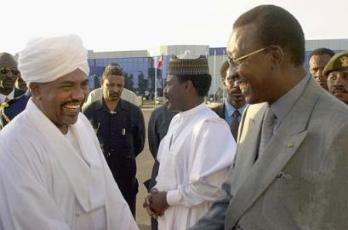Deby flies to Khartoum to discuss conflict in western Sudan

By ABAKAR SALEH Associated Press Writer
N’DJAMENA, Chad, Dec 10, 2003 (AP) — President Idriss Deby flew to Khartoum Wednesday to discuss the worsening situation in western Sudan a day after U.N. Secretary-General Kofi Annan expressed alarm at reports of widespread abuse against civilians in the region caught up in the repression of a rebellion involving members of Deby’s own tribe.
Peace talks between rebels of the Sudan Liberation Army, many of whom are Zaghawa – a tribe that lives on both sides of the Chad-Sudan border – and Sudanese government representatives were to have resumed Wednesday in Chad, Sudan’s western neighbor. But instead Deby left with a large party of government officials for Khartoum where he was expected to meet with President Omar el-Bashir.
A statement from Annan’s office Tuesday said he had “expressed his alarm at the rapidly deteriorating humanitarian situation in the Darfur region of Sudan, and at reports of widespread abuses against civilians, including killings, rape and the burning and looting of entire villages.”
“Insecurity is also severely hampering humanitarian assistance efforts as many of the 1 million civilians affected by the conflict remain beyond the reach of relief workers,” the statement said.
Deby’s trip to Khartoum came as Sudanese government officials and rebels who have been fighting a 20-year war in southern Sudan met in Kenya for what both participants and mediators say could be the final round of peace talks leading to the establishment of a six-year interim administration in the south.
Since the beginning of the year, rebels demanding self-determination for the Darfur region have been fighting government troops and government-backed militias known in Arabic as “janjawid” or men on horseback.
The militiamen are drawn from Sudan’s Muslim, Arab population. The Zaghawa and other tribes in Darfur, although Muslim, are black Africans, often of mixed Arabic ancestry.
Deby, who came to power in December 1990 after leading a rebellion based in Darfur, brokered the initial Sept. 3 cease-fire agreement in the western Sudan conflict. On Nov. 4, this agreement was extended for another 30 days, and another round of talks, originally scheduled for Dec. 4, was to have begun Wednesday.
Because humanitarian agencies haven’t yet obtained government authorization to work in the Darfur region because of insecurity, it is difficult to ascertain the real number of victims and people displaced by fighting. Figures run from 500,000 to 1 million.
But in the rugged border region of Chad, officials from Medecins Sans Frontieres, the humanitarian agency whose name in English means Doctors Without Borders, say they counted some 13,000 refugees arriving last week in the area north and south of the border town of Adre.
“But this border is very long, and people, who are basically nomadic, are moving a lot, so we really don’t know the total number who have come across, although there has definitely been an increase in the past week,” said Michel Francoys, MSF head of mission in Chad.
In a Nov. 27 statement, Amnesty International accused Sudan of committing human rights abuses and fomenting a humanitarian crisis in the Darfur region.
The human rights organization interviewed refugees at nine sites in eastern Chad.
“The testimonies of scores of refugees describing attacks on rural communities by militias, which included members of the armed forces or other security forces, has led us to the bleak conclusion that at least some elements in the army are encouraging this devastation,” the statement said.
The independent biweekly N’Djamena Hebdo has questioned editorially whether Deby is the best mediator in the Darfur conflict, given his ties to the Zaghawa community on both sides of the border. But the newspaper also pointed to what it termed his “halfhearted” objections to the bombing by Sudanese government planes of Zaghawa villages and cross-border raids by Sudanese government troops into Chadian territory.
N’Djamena Hebdo suggested that the visit early last month to Chad by former Malian President Alpha Oumar Konare, the new head of the African Union secretariat, could signal the involvement of “other points of view” in attempts to settle the Darfur conflict.
